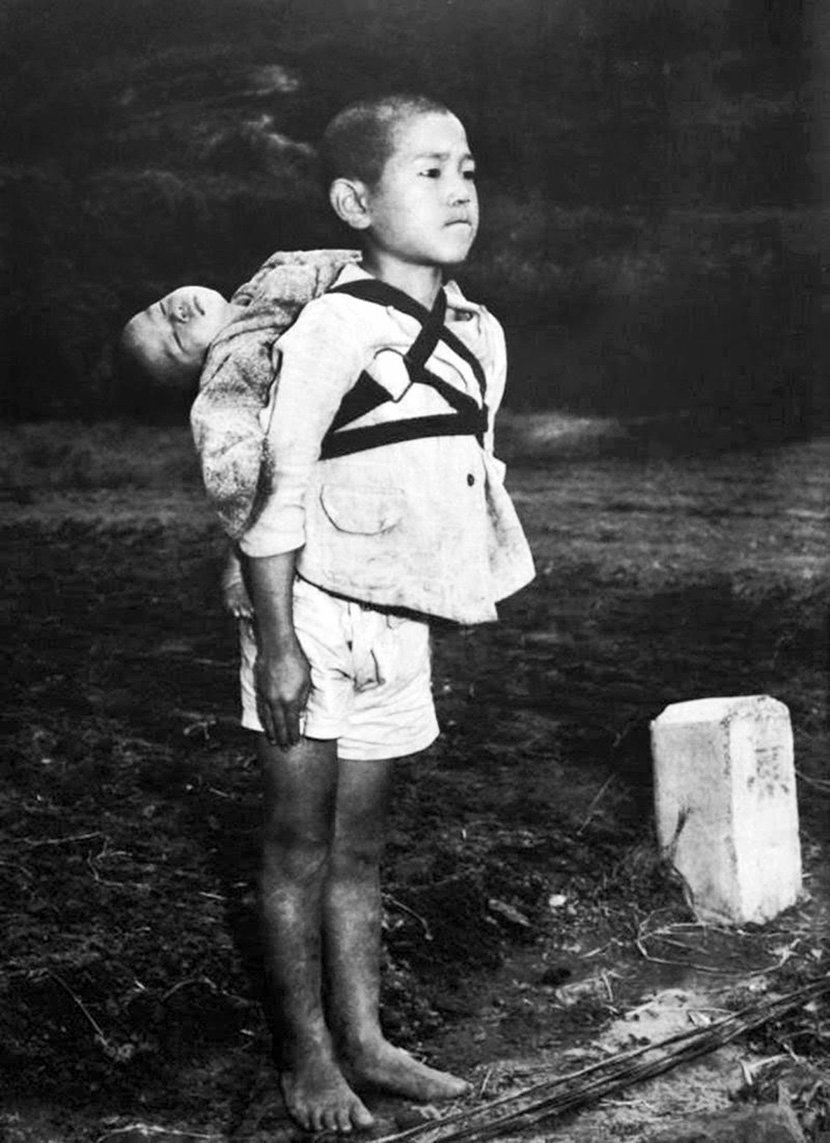A woman who lives her life with stories of an atomic bomb: She told us what words stay in her memory of the survivors from Hiroshima and Nagasaki (PHOTO)
The world almost fell apart during the World War two. The countries were tortured with fights, soldiers were killed on the front lines, and the numerous civilians have brutally died in horrific camps. After the capitulation of Germany and Italy in 1945, Japan was the only state of the axis that continued to fight. By the decision of US President Harry Truman, atomic bombs were thrown to Japan's cities of Hiroshima and Nagasaki on August 6 and 9, and the world was changed from its roots.
The most famous Serbian warrior wounded in Ukraine (PHOTO)

The order was carried out by American bombers, and this was the first event in history when nuclear weapons were used, the act itself is still controversial. The consequences were terrible, almost everything was wiped out in the moment, a large number of people were killed, and even more were seriously injured and continue to live to this day with the consequences.

Norwegian writer and philologist Anne Helene Thelle writes about this terror that struck Japan in the book "Bombs over Hiroshima and Nagasaki". In an exclusive interview with Telegraf.rs, she talked about her research on this subject, the causes and the consequences, attitudes, and lessons that should be applied in the future.

- Throwing atomic bombs on Hiroshima and Nagasaki was one of the most terrible events in modern history. What inspired you to investigate this topic?
I grew up in Japan, in Kyoto, and I was a young child the first time I visited Hiroshima with my family. Later, we also traveled to Hiroshima on school field trips. So the story of Hiroshima and the atomic bomb has been in my consciousness almost my entire life.
When I started studying Japanese literature at the university, I became interested in the many ways in which the story of Hiroshima is still being told today, both in literature and in popular culture.

- In the book, you say that we don't know the exact number of people who died. Can their exact number today be verified or will we never find out?
I think that the approximate number that is given today is probably quite accurate. But because whole families were killed, most public records lost, and because there probably were people staying in Hiroshima temporarily, foreign workers, and because some families had evacuated, and so on, there is no exact count of how many people were in Hiroshima on that exact day.

- Tell us what is the most horrible information you've encountered during research?
That is a very difficult question, things are horrible at so many different levels. But I think that the stories that have made the greatest impact are the personal stories, of people being unable to help their loved ones, who watched their children/parents/friends die.

- Have you had the opportunity to talk to the survivors of this event? What are their stories? How they describe that day?
Yes, I have had the privilege of meeting survivors on four different occasions. They have different stories depending on how close to the epicenter they were, and how badly injured they were. But something they all shared was the sense of urgency in telling the story to new generations.
And also how strong the images of their experience is with them even today. As one survivor (from Nagasaki) said: the atomic bomb is not something that happened to me 70 years ago, it is something that I carry with me every single day.

- Do you think that the truth is far more terrible than the one that is known to us since the US held Japan under occupation until 1952.? During that time censorship was held in Japan and much of the data about that horrible event in 1945. were held under the key and was destroyed. How much of this censorship even further damaged this entire event?
The US did in fact document very closely damage both to building structures and people, but their findings were not revealed to the public for many years. But I believe that this information is available now and that if one is willing to look, any one can find out what the effect of the bomb was.

- In the book, you state that the authorities in Tokyo took 24 hours to understand how serious the situation really is. Could more people be saved if they responded in time and provided them with adequate assistance?
I am not sure it would have made such a big difference. Even if they had known some hours earlier, no one really understood the immensity of the atomic bomb immediately, and the response to the terrible burns and radiation would have at any rate been inadequate.

- Were the inhabitants of Hiroshima and Nagasaki already sentenced to death, since the atomic bomb was a new weapon and whose consequences could not have been predicted?
I believe that the US was set on using the bomb, to test out their new weapon. So you could say that they were “sentenced to death”. On the other hand, the fact that Nagasaki became a target was a pure coincidence, since the original target was Kokura, and Nagasaki only became the target due to weather conditions.

- How do you see the justifications for throwing these bombs? In the book, you write about a number of theories. That the bomb was necessary to end the war, that the Japanese would not surrender without it, that it was used because it was available and that the Americans wanted to consolidate their position in the Pacific. Which of these theories seems most likely to be true? In your opinion what was the real reason?
I do not believe that the bomb was necessary to end the war, and I am quite confident that American intelligence knew that Japan was close to surrender. But I do believe that many people on the American side believed that Japan would not surrender. And I do, also, believe that there at some level was a desire to get a foot ahead of Soviet and take a lead in the Pacific.
But most of all, I believe that the bomb was used because they had made it, and it was available and ready to use. Bombing civilian targets was a tactic used during the entire war, only with smaller, more conventional bombs.

- In that time Japan was facing war and numerous conquests, and many countries in its surroundings had been enslaved at the time. There were not many people who liked Japan in that time. Could it be that this land perhaps paid the high price for its earlier actions?
Yes, I think the role that Japan had played in the years prior to the atomic bomb made it easier to justify the use of such a terrible weapon.

- The people of Japan blindly believed their Emperor, and the soldiers were trained to fight to the last breath. According to your writing, some families committed suicide massively when the Americans conquered them. Could the whole nation be the victim of a wrong policy and could they have been manipulated by a man whom they blindly believed - their "god" - the Emperor?
The mass suicides occurred on Okinawa, where American troops landed. The Japanese had been taught that the Americans were terrible barbarians that would rape all their women, and some families chose suicide rather than succumb to such a terrible fate. I think it is fair to say that the Japanese people had been manipulated by propaganda, and in that sense were “victims” of their own government. The indoctrinations started at an early age and the schools
I think it is fair to say that the Japanese people had been manipulated by propaganda, and in that sense were “victims” of their own government. The indoctrinations started at an early age, and the schools were committed to the Emperor worship.

- The consequences of this event were terrible and are still felt in Japan today. What kind of life did the survivors face later? Many of them were also discriminated for their illness. Why were they so cruel?
I think that the discrimination of the victims of the atomic bomb mostly can be accounted to fear. People feared that their illness would be contagious, that it could be passed on to future generations, and so on. People did not have, in the beginning, any clear idea of what an atomic weapon was. So for many survivors, they faced many difficulties in the years after the war.
Hiroshima and Nagasaki were not the only cities in Japan destroyed by bombing, almost all major Japanese cities were completely destroyed. Still, statistics show that recovery was slower in the two cities destroyed by the atomic bombs.

- There was a lot of talk about atomic and later nuclear weapons in order to raise awareness about it. But in the course of the Cold War, we have a ringing policy with these weapons between the USSR and the United States. Was it an irresponsible policy with regard to what happened in the immediate past?
It seems to me that in the nuclear arms race that followed in the Cold War, nuclear weapons transformed from a real weapon that maims and kills innocent people into some sort of abstract measurement of a nation’s power. I will never understand the logic of the “balance of power”, although I can see the rationale of it if one completely forgets what nuclear weapons are, and what they do.

- Do you think that the world would be a better place without a nuclear weapon and that could we succeed if we join forces? What is the right path? It's kind of the duty of all of us because you yourself in the book stated that responsibility is on us.
Yes, I believe that a world free of nuclear weapons would be better for all – just as it was a step in the right direction to ban the use of biochemical weapons and cluster bombs. At the same time, the idealist in me likes to think that it is possible to imagine not only the world free of nuclear weapons but a world where all nations come together to aim to eliminate the underlying causes of war – poverty, famine, lack of education and so on.

- How did this whole story affect you personally? And what has left an impression on you?
The story of Hiroshima and Nagasaki feel very personal to me since they are stories that took place in Japan, the country that I grew up in, a country that I love. I, therefore, feel very close to the story. And as a person with background from literature, it is, in particular, the many individual stories that I have encountered – through literature, popular culture, film, and personal encounters, that have left the deepest mark.

- Do you feel that something similar could happen again in the future because the world politics in the last few years are rather unstable, or have we all learned heavy lessons from the past?
I sometimes fear for the future. But at the same time, I hope that we all have learned from the past. Sometimes I think that the biggest reason we have not seen nuclear weapons used again after Hiroshima and Nagasaki is that they, in fact, were used during the second world war.
That is because we have seen what the consequences of a nuclear bomb are, it is that much harder for any world leader to justify it being used again. That is why it is so important to keep telling stories about the bomb, to keep the memories of the experience of the people of Hiroshima and Nagasaki alive.

(Telegraf.co.uk / A. Taskovic - a.taskovic@telegraf.rs)
Video: Zafranović: David je ostavio veliki trag u srpskoj kinematografiji
Telegraf.rs zadržava sva prava nad sadržajem. Za preuzimanje sadržaja pogledajte uputstva na stranici Uslovi korišćenja.

